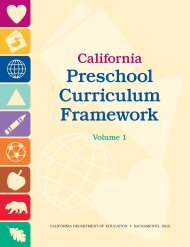Infant Toddler Learning & Development Foundations
Infant Toddler Learning & Development Foundations
Infant Toddler Learning & Development Foundations
Create successful ePaper yourself
Turn your PDF publications into a flip-book with our unique Google optimized e-Paper software.
distinguishes between two types of<br />
categorization made by infants: perceptual<br />
and conceptual. Perceptual<br />
categorization has to do with similarities<br />
or differences infants sense, such<br />
as similarities in visual appearance.<br />
Conceptual categorization has to do<br />
with grouping based on what objects<br />
do or how they act. According to Mareschal<br />
and French (2000, 59), “the<br />
ability to categorize underlies much of<br />
cognition.” Classification is a fundamental<br />
skill in both problem solving<br />
and symbolic play.<br />
Symbolic Play<br />
Symbolic play is a common early<br />
childhood behavior also called “pretend<br />
play, make-believe play, fantasy<br />
play . . . or imaginative play” (Gowen<br />
1995, 75). Representational thinking<br />
is a core component of symbolic play.<br />
At around eight months of age, infants<br />
have learned the functions of common<br />
objects (for example, holding a play<br />
telephone to “hear” Grandma’s voice).<br />
By the time children are around 18<br />
months of age, they use one object to<br />
stand for, or represent, another. For<br />
example, an 18-month-old may pretend<br />
a banana is a telephone. At<br />
around 36 months, children engage in<br />
make-believe play in which they represent<br />
an object without having that<br />
object, or a concrete substitute, available.<br />
For example, they may make a<br />
“phone call” by holding their hand up<br />
to their ear.<br />
As children approach 36 months of<br />
age, they increasingly engage in pretend<br />
play in which they reenact familiar<br />
events. Make-believe play allows<br />
older infants to try to better understand<br />
social roles, engage in communication<br />
with others, and revisit<br />
63<br />
and make sense of past experiences.<br />
Research suggests that engaging in<br />
pretend play appears to be related to<br />
young children’s developing understanding<br />
of other people’s feelings and<br />
beliefs (Youngblade and Dunn 1995).<br />
Outdoor environments, such as sandboxes<br />
(Moser 1995) or play structures,<br />
offer rich opportunities for symbolic<br />
play or pretending. Although outdoor<br />
play areas are often considered most<br />
in terms of motor behavior or physical<br />
activity, they also offer special opportunities<br />
for symbolic play (Perry 2003).<br />
For example, children playing outside<br />
may pretend to garden or may use a<br />
large wheeled toy to reenact going on a<br />
shopping trip.<br />
Attention Maintenance<br />
Attention maintenance has been<br />
described as a form of cognitive selfregulation.<br />
It refers to the infant’s<br />
growing ability to exercise control over<br />
his attention or concentration (Bronson<br />
2000). Attention maintenance<br />
permits infants to gather information,<br />
to sustain learning experiences, to<br />
observe, and to problem-solve. <strong>Infant</strong>s<br />
demonstrate attention maintenance<br />
when they attend to people, actions,<br />
and things they find interesting even<br />
in the presence of distractions. The<br />
ability to maintain attention/concentration<br />
is an important self-regulatory<br />
skill related to learning. There is<br />
significant variability in attentiveness<br />
even among typically developing children<br />
(Ruff and Rothbart 1996).<br />
Understanding of Personal<br />
Care Routines<br />
Personal care activities are a routine<br />
part of the young child’s daily life.<br />
They also present significant opportu-<br />
COGNITIVE DEVELOPMENT
















